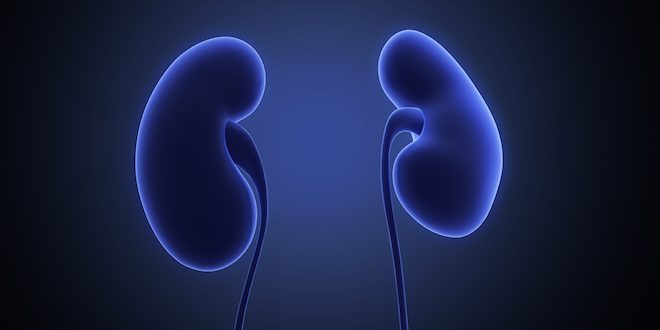Diabetes is the leading cause of kidney disease – known as nephropathy. Diabetes Canada reports that approximately one third of people living with diabetes for more than 15 years will develop the condition. The good news is that diabetes and kidney complications takes many years to develop and, in many cases, regular screening and careful diabetes management can help slow its progression. Importantly, these measures can also help many people avoid the development of kidney disease in the first place.
Diabetes and the kidneys
The kidneys’ job is to filter waste products from the blood, by removing them in the urine. In people with diabetes, high blood glucose levels over a period of time can damage the blood vessels in the kidneys. This can cause them to filter too much blood and eventually to leak an important protein called albumin. If the disease is allowed to progress, increasing amounts of protein will enter the urine, leading to a condition called proteinuria. This can lead to kidney failure and the need for either dialysis or a kidney transplant. At this point, the condition is known as end-stage renal failure.
Tips to prevent or delay kidney damage
The most important way to help prevent kidney disease is to keep blood glucose levels within target. Blood pressure should also be carefully monitored. People with diabetes should also have regular screening for kidney disease. This will usually include urine tests for protein, and blood tests for creatinine. Creatinine is a waste product that healthy kidneys filter from the blood.
Other important strategies for people with diabetes include:
- Avoid smoking
- Keep cholesterol levels within target
- Avoid medications that can harm the kidneys. Ask the pharmacist for more information about over-the-counter drugs to avoid, which may include ibuprofen
- Follow a healthy eating plan and reduce salt intake. In some cases of kidney disease, a low protein diet may be advised. Follow the recommendations of the diabetes team
- Engage in regular physical activity
- Take the prescribed medications. If kidney disease has been detected, these will likely include medication to slow the loss of kidney function
As always, the most important way to avoid diabetes complications is to follow the diabetes management plan recommended by the diabetes team. You may also want to read Dr. Maureen Clement's expert blog Kidneys...seven miles of blood vessels. Protect them!
 Diabetes Care Community Learn, connect and care
Diabetes Care Community Learn, connect and care






